
Abraham is the common Hebrew patriarch of the Abrahamic religions, including Judaism, Christianity, and Islam. In Judaism, he is the founding father of the special relationship between the Jews and God; in Christianity, he is the spiritual progenitor of all believers, whether Jewish or non-Jewish; and in Islam, he is a link in the chain of Islamic prophets that begins with Adam and culminates in Muhammad.
The Book of Genesis is the first book of the Hebrew Bible and the Christian Old Testament. Its Hebrew name is the same as its first word, Bereshit. Genesis is an account of the creation of the world, the early history of humanity, and the origins of the Jewish people.
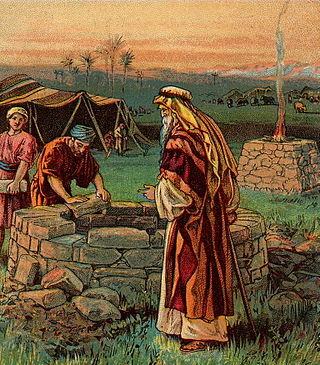
Isaac is one of the three patriarchs of the Israelites and an important figure in the Abrahamic religions, including Judaism, Christianity, and Islam. He was the son of Abraham and Sarah, the father of Jacob and Esau, and the grandfather of the twelve tribes of Israel.
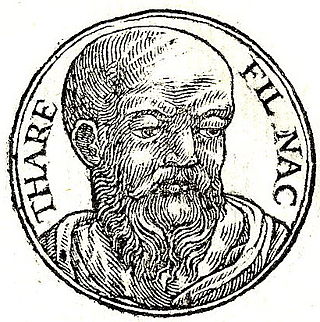
Terah or Terach is a biblical figure in the Book of Genesis. He is listed as the son of Nahor and father of the patriarch Abraham. As such, he is a descendant of Shem's son Arpachshad. Terah is mentioned in Genesis 11:26–27, Book of Joshua 24:2, and 1 Chronicles 1:17–27 of the Hebrew Bible and Luke 3:34–36 in the New Testament.

Sarah is a biblical matriarch, prophetess and major figure in Abrahamic religions. While different Abrahamic faiths portray her differently, Judaism, Christianity, and Islam all depict her character similarly, as that of a pious woman, renowned for her hospitality and beauty, the wife and half-sister of Abraham, and the mother of Isaac. Sarah has her feast day on 1 September in the Catholic Church, 19 August in the Coptic Orthodox Church, 20 January in the LCMS, and 12 and 20 December in the Eastern Orthodox Church.
The biblical patriarch Isaac is recognized as a prophet and messenger of God by Muslims. As in Judaism and Christianity, Islam maintains that Isaac was the son of the patriarch and prophet Abraham from his wife Sarah. Muslims hold Isaac in deep veneration because they believe that both Isaac and his older half-brother Ishmael continued their father's spiritual legacy through their subsequent preaching of the message of Allah after the death of Abraham. Isaac is mentioned in fifteen passages of the Quran. Along with being mentioned several times in the Quran, Isaac is held up as one of Islam's prophets.

Ishmael was the first son of Abraham, the common patriarch of the Abrahamic religions, through his wife Sara's handmaiden Hagar. According to the Genesis account, he died at the age of 137.

According to the Book of Genesis, Hagar was an Egyptian slave, a handmaiden of Sarah, whom Sarah gave to her own husband Abram as a wife to bear him a child. Abraham's firstborn son, through Hagar, Ishmael, became the progenitor of the Ishmaelites, generally taken to be the Arabs. Various commentators have connected her to the Hagrites, perhaps claiming her as their eponymous ancestor. Hagar is alluded to, although not named, in the Quran, and Islam considers her Abraham's second wife.

Lot was a man mentioned in the biblical Book of Genesis, chapters 11–14 and 19. Notable events in his life recorded in Genesis include his journey with his uncle Abram (Abraham); his flight from the destruction of Sodom and Gomorrah, during which his wife became a pillar of salt, and his being intoxicated by his daughters so that they could have incestuous intercourse with him to continue their family line.

The Bible: In the Beginning... is a 1966 religious epic film produced by Dino De Laurentiis and directed by John Huston. It recounts the first 22 chapters of the Biblical Book of Genesis, covering the stories from The Creation and Adam and Eve to the binding of Isaac.

Lech-Lecha, Lekh-Lekha, or Lech-L'cha is the third weekly Torah portion in the annual Jewish cycle of Torah reading. It constitutes Genesis 12:1–17:27. The parashah tells the stories of God's calling of Abram, Abram's passing off his wife Sarai as his sister, Abram's dividing the land with his nephew Lot, the war between the four kings and the five, the covenant between the pieces, Sarai's tensions with her maid Hagar and Hagar's son Ishmael, and the covenant of circumcision.
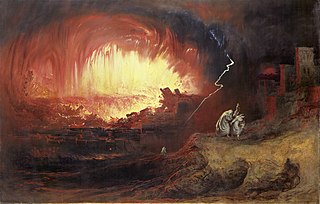
Vayeira, Vayera, or Va-yera is the fourth weekly Torah portion in the annual Jewish cycle of Torah reading. It constitutes Genesis 18:1–22:24. The parashah tells the stories of Abraham's three visitors, Abraham's bargaining with God over Sodom and Gomorrah, Lot's two visitors, Lot's bargaining with the Sodomites, Lot's flight, the destruction of Sodom and Gomorrah, how Lot's daughters became pregnant by their father, how Abraham once again passed off his wife Sarah as his sister, the birth of Isaac, the expulsion of Hagar, disputes over wells, and the binding of Isaac.

Chayei Sarah, Chaye Sarah, Ḥayye Sarah, or Ḥayyei Sara, is the fifth weekly Torah portion in the annual Jewish cycle of Torah reading. It constitutes Genesis 23:1–25:18. The parashah tells the stories of Abraham's negotiations to purchase a burial place for his wife Sarah and his servant's mission to find a wife for Abraham's son Isaac.
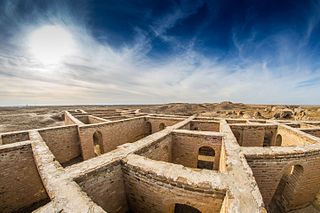
Ur Kasdim, commonly translated as Ur of the Chaldeans, is a city mentioned in the Hebrew Bible as the birthplace of Abraham, the patriarch of the Israelites and the Ishmaelites. In 1862, Henry Rawlinson identified Ur Kaśdim with Tell el-Muqayyar, near Nasiriyah in Baghdad Eyalet. In 1927, Leonard Woolley excavated the site and identified it as a Sumerian archaeological site where the Chaldeans were to settle around the 9th century BC. Recent archaeology work has continued to focus on the location in Nasiriyah, where the ancient Ziggurat of Ur is located.
In biblical studies, the term wife–sister narratives in Genesis refers to three strikingly similar stories in chapters 12, 20, and 26 of the Book of Genesis. At the core of each is the story of a biblical patriarch who has come to be in the land of a powerful foreign overlord who misidentifies the Patriarch's wife as the Patriarch's sister, and consequently attempts to wed her himself. The overlord later finds out his error. Two of the three stories are similar in many other details, including the ruler's name, Abimelech.
Abraham is known as the patriarch of the Israelite people through Isaac, the son born to him and Sarah in their old age and the patriarch of Arabs through his son Ishmael, born to Abraham and Hagar, Sarah's Egyptian servant.
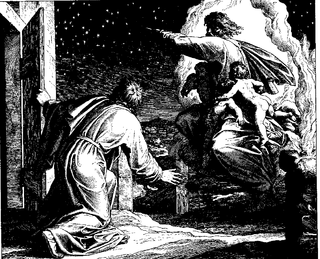
The ruins of the city of Harran, called Haran in the Hebrew Bible, might lie within present-day Turkey. Haran first appears in the Book of Genesis as the home of Terah and his descendants, and as Abraham's temporary home. Later biblical passages list Haran among some cities and lands subjugated by Assyrian rulers and among Tyre's trading partners.

Rebecca appears in the Hebrew Bible as the wife of Isaac and the mother of Jacob and Esau. According to biblical tradition, Rebecca's father was Bethuel the Aramean from Paddan Aram, also called Aram-Naharaim. Rebecca's brother was Laban the Aramean, and she was the granddaughter of Milcah and Nahor, the brother of Abraham. Rebecca and Isaac were one of the four couples that some believe are buried in the Cave of the Patriarchs, the other three being Adam and Eve, Abraham and Sarah, and Jacob and Leah.

In the account of Terah's family mentioned in the Book of Genesis, Nahor II is listed as the son of Terah, amongst two other brothers, Abram and Haran. His grandfather was Nahor I, son of Serug. Nahor married the daughter of his brother Haran, Milcah, his niece. They may all have been born and raised in the city of Ur: the biblical account states that "Haran died before his father Terah in the land of his birth, in Ur of the Chaldeans".

His Only Son is a 2023 American biblical drama film produced, edited, written and directed by David Helling. Primarily set in Canaan, the film centers on the account from Genesis 22 in the Old Testament when the Lord tells Abraham to sacrifice his only son, Isaac, on Mount Moriah. The film stars Nicolas Mouawad as Abraham, Sara Seyed as Sarah, Edaan Moskowitz as Isaac, and Daniel da Silva as the Lord, alongside Ottavio Taddei and Nicolai Perez. It was released in the United States on March 31, 2023.
















